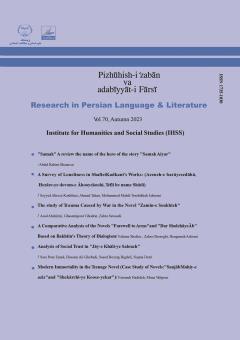Analysis of Social Trust in "Jāy-e Khāli-ye Salouch"
Subject Areas : Interdisciplinary Literary Studies
sara pouremad
1
![]() ,
hoseinali ghobadi
2
*
,
hoseinali ghobadi
2
*
![]() ,
saeed bozorg bigdeli
3
,
saeed bozorg bigdeli
3
![]() ,
Najmeh Dorri
4
,
Najmeh Dorri
4
![]()
1 - Ph.D Student of Persian Language and Literature, Tarbiat Modares University, Iran. s.pouremad@gmail.com
2 - Professor, Department of Persian Language and Literature, Tarbiat Modares University, Iran.
3 - Associate Professor, Department of Persian Language and Literature, Tarbiat Modares University, Iran.
4 - Associate Professor, Department of Persian Language and Literature, Tarbiat Modares University, Iran.
Keywords: Social Capital, Social Trust, Anthony Giddens, "Jāy-e Khāli-ye Salouch", Mahmoud Dowlatabadi. ,
Abstract :
A reciprocal and ongoing interaction holds between literature and society. Some literary creations, particularly novels, represent and reflect societal concerns more than others. Drawing on Anthony Giddens’s theoretical framework, this descriptive-analytical study has been aimed to delve into a social issue in Mahmoud Dowlatabadi’s"Jāy-e Khāli-ye Salouch".Trust is a crucial component in every society and an indicator of social capital, for which sociologists have proposed multiple definitions and types. Indeed, distrust remains a shaky pillar of social harm.This analysis explores the roots of the widespread distrust that Dowlatabadi narrates in "Jāy-e Khāli-ye Salouch". The results indicated that the novel spotlights how the White Revolution in Iran, with land reform as its principal policy, and its consequent troubles for Iranian villagers impacted the amplification of distrust among the misery-ridden villagers. It pinpoints that the failure of Shah’s economic policies pertaining to the White Revolution and the incapability of the social system to address public participation were among the factors that diminished social trust. Unemployment, poverty, and migration from villages were some of the main outcomes of this project. Another contributor to distrust is injustice. The transformation of the underlying pillars of economic life, the state’s poor performance, and the consequent dire economic status of villagers were the major causes of distrust represented in "Jāy-e Khāli-ye Salouch". The novel’s weightiest types of distrust were institutional and interpersonal, highlighting the villagers’ lack of trust in the government and signifying that the policies of the second Pahlavi regime were not directed toward developing different types of trust.
امامیخویی، محمدتقی و نرگس ضیایی (1385) «اصلاحات ارضی و تأثیرات اقتصادی آن بر جامعۀ کشاورزی ایران»، نشریه مسکویه، پیش¬شمارۀ 4، صص 59- 86.
امیرکافی، مهدی (1380) «اعتماد اجتماعی و عوامل مؤثر بر آن»، نشریۀ نمایۀ پژوهش، شماره 18، صص 9-42.
جمعی از نویسندگان (1399) در جست¬وجوی اعتماد اجتماعی در ایران، تهران، پارسه.
دولتآبادی، محمود (1393) جای خالی سلوچ، تهران، چشمه.
روتنبرگ، کن جی (1400) روانشناسی اعتماد، ترجمۀ اسماعیل سعدیپور و مهشید سالور، تهران، وانیا.
روثستاین، بو (1401) دامهای اجتماعی و مسئلۀ اعتماد، ترجمه لادن رهبری و دیگران، چاپ دوم، تهران، آگه.
زتومکا، پیوتر (1386) اعتماد نظریۀ جامعهشناختی، ترجمۀ غلامرضا غفاری، تهران، شیرازه.
زینآبادی، مرتضی (1387) «تئوریها و نظریات مربوط به اعتماد»، پژوهشنامه، شماره 17، صص 30-52.
سهرابنژاد، علیمحمد (1397) «بازتاب اعتماد به¬مثابه یکی از مؤلفههای سرمایۀ اجتماعی در گلستان سعدی»، جامعهپژوهی فرهنگی، شماره 4، صص 41-65.
علامی، ذوالفقار و لیلا رکابدار (1397) «ماهیت و جایگاه انواع اعتماد اجتماعی در گرشاسپنامۀ اسدی طوسی»، جامعهپژوهی فرهنگی، شماره 2، صص 83-100.
فاضل، رضا و الهام میری آشتیانی (1387) آسیبهای اجتماعی ایران؛ نگاهی به آینده، تهران، مجمع تشخیص مصلحت نظام، پژوهشکدۀ تحقیقات استراتژیک.
فروزنده، مسعود و دیگران (1399) «بررسی اعتماد اجتماعی در دیوان سیف فرغانی از منظر جامعهشناختی»، فنون ادبی، شماره 4، صص 111-132.
فوکویاما، فرانسیس (1400) اعتماد، فضائل اجتماعی و خلق سعادت، ترجمۀ سید علیرضا بهشتی شیرازی، تهران، روزنه.
فهندژسعدی، سیده معصومه (1401) «تأثیر دین¬داری بر اعتماد سیاسی در جمهوری اسلامی»، پژوهشنامۀ تاریخ، سیاست و رسانه، شماره 18، صص 105-128.
گیدنز، آنتونی (1399) پیامدهای مدرنیت، ترجمۀ محسن ثلاثی، تهران، مرکز.
میرصادقی، جمال (1394) عناصر داستان، تهران، سخن.
میرعابدینی، حسن (1399) صد سال داستاننویسی ایران، تهران، چشمه.
نصراصفهانی، محمدرضا و میلاد شمعی (1386) «تحلیل عنصر شخصیت در رمان جای خالی سلوچ اثر محمود دولتآبادی»، نشریۀ پژوهشنامۀ ادب غنایی، شماره 9، صص 153-176.
------------------------------ (1388) «نقد جامعهشناختی رمان جای خالی سلوچ اثر محمود دولتآبادی»، جامعهشناسی کاربردی، شماره 36، صص 111-128.
نیازی، محسن و محمد کارکنان نصرآبادی (1387) «آسیبشناسی اعتماد اجتماعی در دیوان فیض کاشانی»، فصلنامۀ کاشان شناخت، شماره 4 و 5، صص 153-172.
وجدانی، فاطمه و مرضیه محصص (1398) «مبانی اعتماد اجتماعی در متون دینی»، فصلنامۀ نظریههای اجتماعی متفکران مسلمان، سال نهم، شماره اول، صص 31-80.

